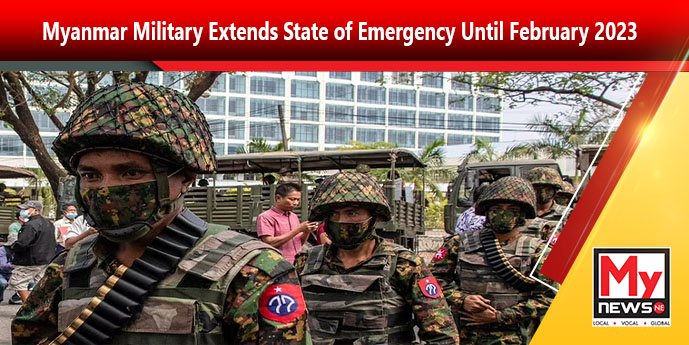Myanmar Military Extends State of Emergency Until February 2023
Guwahati: The military government has prolonged the country’s state of emergency until 2023 since internal warfare has continued in Myanmar since the coup last year.
The junta seized control last year following the collapse of Aung Sung Suu Kyi’s democratically elected government.
Future elections will be held in a “free and fair” manner, according to the military.
However, it stated on Monday that additional time was needed to stabilise the nation. According to a BBC report, the emergency rule provides it extra authority to detain people.
The military will either host multi-party elections or hand over state control to an elected administration, but many people in Myanmar remain sceptical.
Last August, the government of General Min Aung Hlaing first declared a state of emergency. Using the authority afforded by the order, he also named himself prime minister.
He also suggested that the nation’s electoral system be changed, combining proportional representation with the first-past-the-post system, which let Ms. Suu Kyi’s National League for Democracy (NLD) win the 2020 election with ease.
He said that other political opinions had been silenced by the influence of “strong parties.”
The army – known as the Tatmadaw – launched the coup after alleging there had been massive voter fraud in the 2020 election, in which the NLD got more than 83% of the vote.
International observers said the voting was largely free and fair.
Ms. Suu Kyi and a number of her party’s ministers were detained by the army. In June, Ms. Suu Kyi was transferred to solitary detention.
Millions of people protested peacefully in the streets, demanding the military hand over authority. Rubber bullets, water cannons, and live fire were used by the military as a response.
The Assistance Association of Political Prisoners (AAPP), a rights organisation, claims that more than 2,100 persons have been slain by security personnel. Additionally, the military is charged with imprisoning thousands of opponents in politics and civil society.
The junta executed four pro-democracy campaigners last week, marking the first executions in the nation in many years. They included well-known proponents of democracy Ko Jimmy and former lawmaker and rapper Phyo Zeya Thaw.
Outside of the nation’s capital Naypyidaw, the military administration is fiercely opposed, and the People’s Defence Force is a live guerrilla front (PDF).
For a second session of negotiations, Gen. Min Aung Hlaing also extended an invitation to the heads of Myanmar’s ethnic rebel armies, which have been engaged in a decades-long conflict with both the state and each other.
A first round of negotiations was held in May, although certain rebel groups that fight with the PDF were not present.

